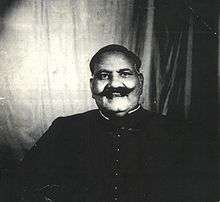Bade Ghulam Ali Khan
| Bade Ghulam Ali Khan | |
|---|---|
| Also known as | Sabrang |
| Born |
2 April 1902[1] Kasur, Punjab, British India |
| Died |
25 April 1968[1] Hyderabad, India |
| Genres | Hindustani classical music |
| Occupation(s) | singer - Kasur-Patiala gharana |
| Years active | 1923–1967 |
| Labels | HMV, Times Music |

Bade Ghulam Ali Khan (Devanagari:बड़े ग़ुलाम अली ख़ान, Shahmukhi/Urdu: بڑے غلام علی خان) (c. 2 April 1902 – 25 April 1968) was a Hindustani classical vocalist, from the Kasur Patiala Gharana.[1][2]
Early life and background
Bade Ghulam Ali Khan was born in Kasur, a small town near Lahore, Pakistan then Punjab province in British India. After partition of India in 1947, Kasur became a part of Pakistan. His father Ustad Ali Baksh Khan was a singer in a West Punjabi family of musical heritage. He belonged to a famous classical musical gharana called Kasur Patiala Gharana of Punjab, originally of Pashtun origin.[1]
At the age of five, Ustad Bade Ghulam Khan sahib started learning vocal music from his paternal uncle Ustad Kale Khan sahib , and later from his father Ustad Ali Baksh Khan sahib of Kasur Gharana. He had three brothers namely Barkat Ali Khan, Mubarak Ali Khan and Amaan Ali Khan.
Singing career
Though he started his career by singing a few compositions of his late father Ustad Ali Baksh Khan sahib and uncle Ustad Kale Khan sahib of Kasur Gharana, Ustad Bade Ghulam Ali Khan amalgamated the best of four traditions into his own Patiala-Kasur style, the Behram Khani elements of Dhrupad, the gyrations of Jaipur, and the behlavas (embellishments) of Gwalior. His raga expositions were brief contrary to convention and while he agreed that the beauty of classical music lay in leisurely improvisation, he believed that the audience would not appreciate long alaps and he had to sing for the masses and change the music to what the audience wanted.
After the partition of India in 1947, Ustad Bade Ghulam Ali Khan went to his hometown Kasur in Pakistan, but returned to India later to reside permanently there in 1957, with the help of Bombay chief minister Morarji Desai, he acquired Indian citizenship and moved to a bungalow at Malabar Hill in Mumbai. He lived at various times in Lahore, Bombay, Calcutta, and Hyderabad.
For a long time, he stayed away from singing in films despite requests and persuasions from well-known producers and music directors. However he was coaxed and convinced by film producer K Asif to sing two songs based on ragas Sohni and Rageshree for the 1960 film Mughal-e-Azam with the music directed by Naushad. He demanded and received an extremely high price, reportedly to the tune of Rupees 25,000 per song, when the rate for popular and star playback singers such as Lata Mangeshkar and Mohammed Rafi was below Rupees 500 per song at that time.
He was awarded with eight big awards of India – the Sangeet Natak Akademi Award, Sur Devta Award, Aftab-e Mauseeqi Award, Sangeet Samrat Award, and then Padma Bhushan Award in 1962.[3]
He died at Basheerbagh Palace in Hyderabad on 25 April 1968, after a prolonged illness which left him partially paralyzed in the last few years of his life. He continued to sing and perform in public with the support of his younger son Ustad Munawar Ali Khan until his death.[4]
The legacy
After his death, his legacy was carried by his younger son Ustad Munawar Ali Khan and then by his four grandsons :
- Ustad Mazhar Ali Khan
- Ustad Jawaad Ali Khan
- Ustad Raza Ali Khan
- Naqqi Ali Khan
Also one student of Ustad Bade Ghulam Ali Khan, Jagdish Prasad[5] made a solo career appreciated by medias, music lovers and institutions.[6][7][8] His son Samrat Pandit is carrying the legacy of both singers since 2001.[9]
In 2017, the Bade Ghulam Ali Khan Yaadgar Sabha founded by his disciple Malti Gilani keeps his music and memory alive.[10]
The main street at Basheerbagh is named Ustad Bade Ghulam Ali Khan Marg in his honour.
Discography
- Mehfil – Ustad Bade Ghulam Ali Khan – Times Music
- Golden Milestones – Ustad Bade Ghulam Ali Khan
- Classical Vocal – Ustad Bade Ghulam Ali Khan
- Sab Rang
References
- 1 2 3 4 http://indiatoday.intoday.in/people/ustad-bade-ghulam-ali-khan/15684.html, Profile of Bade Ghulam Ali Khan, India Today newspaper, Retrieved 5 April 2017
- ↑ http://timesofindia.indiatimes.com/city/hyderabad/remembering-the-legend-bade-ghulam-ali-khan/articleshow/57993825.cms, 'Bade Ghulam Ali Khan: Remembering the legend', The Times of India newspaper, Published 4 April 2017, Retrieved 5 April 2017
- ↑ http://www.in.com/ustad-bade-ghulam-ali-khan/biography-313703.html, Profile of Bade Ghulam Ali Khan, Retrieved 5 April 2017
- ↑ http://www.thehindu.com/mp/2005/11/16/stories/2005111601160300.htm, 'Beat Street', The Hindu newspaper, Published 16 November 2005, Retrieved 6 April 2017
- ↑ Sharma, Manorama (2006). Tradition of Hindustani Music. New Delhi: A.P.H. Publishing Corporation. p. https://books.google.fr/books/about/Tradition_of_Hindustani_Music.html?id=YdtqrooCo-oC&redir_esc=y. ISBN 8176489999. Retrieved 2 August 2017.
- ↑ Kashyap, Dave (20 July 2011). "Hindustani classical vocalist Pandit Jagdish Prasad passes away". The economic times. India Times. Retrieved 2 August 2017.
- ↑ Mudgal, Shubha (5 August 2011). "The story of a song". Live Mint. Retrieved 2 August 2017.
- ↑ Buff, Nicolas. "Celebrated Masters - Jagdish Prasad". itcsra.org. Retrieved 2 August 2017.
- ↑ "His master's voice". The Hindu. 20 March 2003. Retrieved 2 August 2017.
- ↑ http://www.thehindu.com/todays-paper/tp-features/tp-fridayreview/On-ragas-and-riches/article15399735.ece, 'On ragas and riches', The Hindu newspaper, Published 22 August 2008, Retrieved 5 April 2017
External links
| Wikimedia Commons has media related to Bade Ghulam Ali Khan. |
- Manuel, Peter L (1990). Ṭhumrī in historical and stylistic perspectives. Motilal Banarsidass Publisher. ISBN 978-81-208-0673-3.